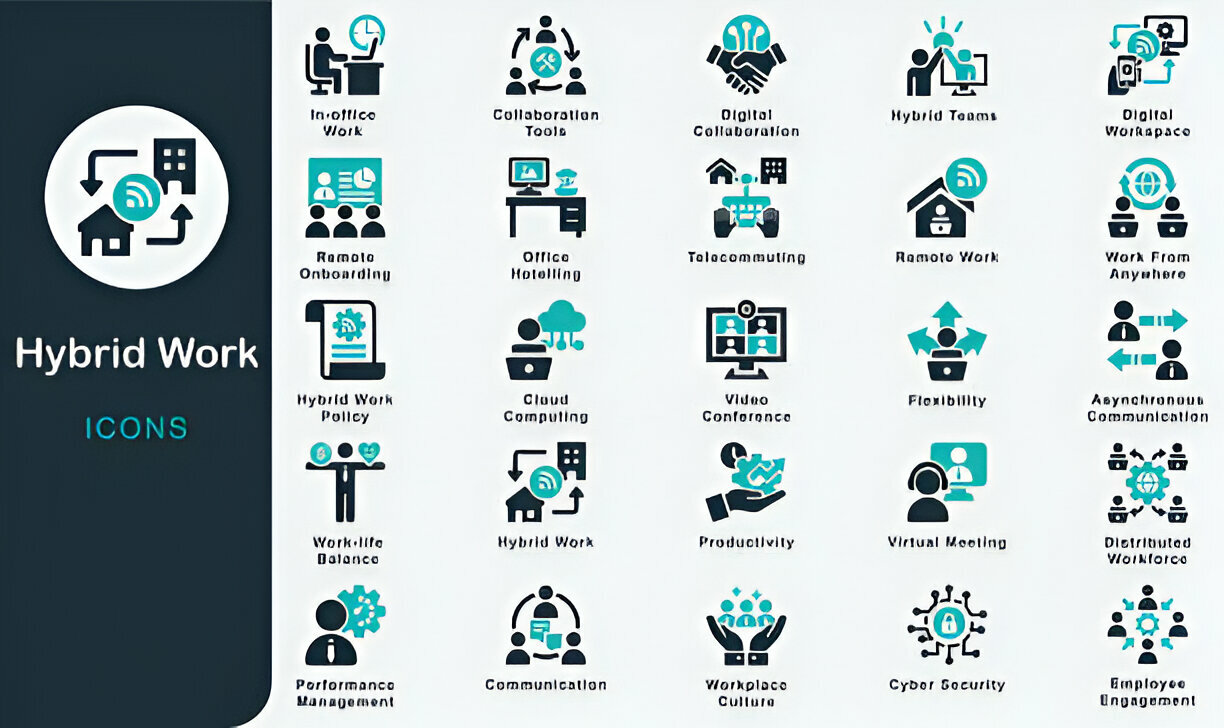As the future of work continues to evolve globally so Nigeria’s small and medium enterprises (SMEs) are rethinking traditional work setups. A key strategy gaining momentum is the hybrid work model. This paradigm is a flexible arrangement that combines remote and in-office work. While many large organizations have made the shift, implementing hybrid work in Nigeria’s SME sector presents unique opportunities and challenges.
DearHR explores the guides on how SMEs can successfully transition to hybrid work, navigate infrastructural and cultural realities, and build a sustainable workplace model.
What is Hybrid Work in Nigeria?
A hybrid work model is a blends of remote and on-site work. Employees typically work a few days from the office and the rest from home or any remote location. This model provides flexibility, helps reduce overhead costs, and often improves employee satisfaction.
For Nigeria just like anywhere in Africa and world at large, the hybrid model offers great promise, especially for SMEs seeking productivity without significant expansion costs. But its success rely on having a well defined policy and tools designed to local realities.

Why Hybrid Work Matters to Nigerian SMEs
1. Talent Retention and Attraction
Hybrid work is increasingly seen as a competitive edge for attracting top talent. Young professionals now seek jobs that allow flexibility. Jobs that allow hybrid work in Lagos, for instance, are becoming more popular on recruitment platforms.
2. Operational Cost Reduction
SMEs can reduce rent, clustered office space, utility, and transport allowances by partially closing physical office spaces or rotating staff presence.
3. Employee Productivity and Satisfaction
Studies show that flexible work arrangements increase employee morale, leading to higher productivity. For Nigerian workers battling traffic congestion in cities like Lagos, Portharcourt and Abuja, hybrid work improves work-life balance and increase productivity.
How to Implement Hybrid Work Model in Nigeria
Wondering how SMEs can make hybrid work really work? Here is easy-to-follow tips, expert guidance, and HR solutions that fit your business like a glove.
1. Assess Business Needs and Roles
In business, not all roles can be remote. Identify jobs that can be done offsite such as marketing, customer support, accounting, or digital services. Then build a hybrid work schedule around them.
2. Develop a Hybrid Work Policy
Every SME needs a clear hybrid work policy for small businesses. This will help drive efficiency and It should outlined thus:
- Eligibility criteria
- Work hours expectations
- Performance tracking tools
- Data security measures
Expert Statement 1: “SMEs must customize hybrid policies to suit their size and sector. There’s no one-size-fits-all,” says Tunde Adebayo, HR Consultant at WorkPlace Africa.
3. Invest in Reliable Infrastructure
For hybrid work to succeed in SMEs, adopting firm need to provide employees with access to:
- Reliable internet (or support allowances)
- Laptops or mobile workstations
- Cloud storage and secure communication tools
4. Address Internet Challenges
Remote work and internet challenges in Nigeria remains a real issue. Many employees rely on mobile data, which can be unstable or expensive for their status. Recommended solutions include:
- Internet stipends
- Partnership with ISPs for team bundles
- Offline-compatible tools
Challenges of Hybrid Work in Nigeria
Hybrid work is appealing, but Nigerian SMEs face real hurdles from poor infrastructure and power issues to limited digital skills as revealed above.Overcoming these challenges is key to making the model work effectively.
1. Poor Power Supply
Power supply is never an issue in an on-site work space, this is a different case with remote work. Employee are more likely to experience unstable electricity thereby affecting remote deliverables. Employers may need to provide power banks or inverter allowances to avoid inactive excuse.
2. Monitoring and Accountability
Trust can be a barrier. Adopting Tools like Slack, Trello, and Google Workspace help track work and employee activities.
3. Cultural Resistance
Traditional Nigerian business culture values physical presence. A transition to hybrid requires mindset change, training and trust-building.
Expert Statement 2: “Cultural buy-in is critical. Employers must train leaders to manage by output, not hours,” explains Uche Eme, Organizational Psychologist at Lagos Business School.
Hybrid Work Policy Example Nigeria
Here’s what a basic hybrid work policy for an SME in Nigeria might include:
- Eligibility: Full-time staff with non-field roles
- Schedule: 3 days remote, 2 days in-office
- Work Hours: 9am–5pm; flexible start time allowed
- Communication: Daily check-in via Slack; weekly Zoom meeting
- Performance: KPIs monitored monthly
Best Tools for Hybrid Teams Nigeria
- Zoom / Google Meet for video calls
- Trello, Asana for task management
- Google Workspace / Microsoft 365 for collaboration
- WhatsApp Business for informal updates
Benefits of Hybrid Working for Nigerian Employees
- Reduced commute stress
- Better work-life balance
- More autonomy
- Less exposure to urban traffic and pollution
Flexible Work Arrangements Companies Nigeria Can Explore
Nigerian SMEs can adopt:
- Remote-first approach: Physical meetings only when necessary
- Rotational office days: Staff work from the office on alternate days
- Compressed workweeks: Longer hours but fewer workdays
Salary Expectations for Hybrid Jobs Nigeria
As hybrid work gains traction in Nigeria, many employees are open to slightly lower salaries in exchange for the flexibility it offers. However, this doesn’t mean SMEs can afford to underpay. To attract skilled professionals, especially in competitive industries like tech and finance, offering fair and appealing salary packages remains essential.
Beyond base pay, additional incentives such as internet stipends, data allowances, and support for home office setups are increasingly expected. These benefits not only enhance employee satisfaction but also show a company’s commitment to creating a productive hybrid work environment.
Final Thoughts: Making Hybrid Work, Work
The future of work is hybrid — and Nigeria’s SMEs can’t afford to be left behind. By taking a structured, localized, and employee-friendly approach, SMEs can build resilient, flexible workplaces that support growth.
Implementing hybrid work in Nigeria requires more than remote tools — it demands strategy, communication, cultural shift, and the right policy framework designed to fit the Nigerian SME reality.


